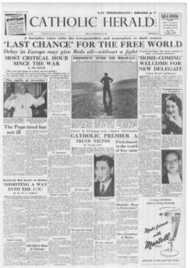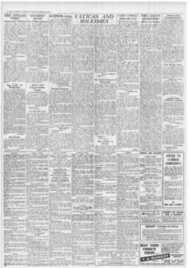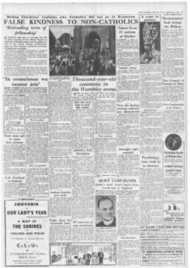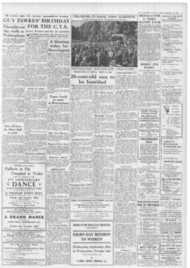Page 8, 24th September 1954
Page 8

Report an error
Noticed an error on this page?If you've noticed an error in this article please click here to report it.
Tags
Share
Related articles
The New Mass, Old And Quite Deliberate
How To Be A Good Commentator
Giving Effect To The Decree
English In The Mass
Vernacular Ritual But Not Mass
Priest's Experience
Epistles, Gospels in vernacular?
By Fr. Clifford Howell, S.J.
I EADI NG liturgists from nearly every country in Europe and from the United States met last week in Belgium to discuss two matters of urgent practical importance—the reform of the Scripture readings at Mass, and the problem of the concelebration of Mass instead of separate Masses when large numbers of priests are gathered together.
Until the lectures and discussions have been laid before the Holy Father, and his permission obtained for their publication, nothing may be said about the conclusions reached by the conference.
It is lawful at present only to make known the subjects which were studied, and the reasons which prompted the organisers to select then, for discussion.
The gathering at the Abbey of Mont Cesar, oear Louvain, was the fourth International Liturgical Conference to continue the study of liturgical reforms begun at the three previous international conferences at Maria Laach, St. Odile and Lugano.
New selection ?
The participants were the guests of Abbot Capelle, himself a liturgist of the first rank. The organisers were the Centre Pastorale Liturgique. of Paris, and the Liturgischcs Institut, of Trier, Joint presidents were Bishop Heintz of Metz and Bishop Stohr of Mainz, who are respectively the heads of the episcopal liturgical committee of France and Germany.
The Holy Father sent a cordial letter of encouragement and blessing with Fr. Antonelli, Relator of the Sacred Congregation of Rites.
As regards the Scripture readings in the Mass, the motive is found in the petition submitted last year by the Lugano conference that the Latin Epistles and Gospels should be eliminated from public Masses and be replaced by readings in the people's own tongue, to be given to them directly by the sacred Minister —deacon at High Mass, priest at Low Mass—as part of the liturgy itself.
If this petition is to be granted, it is obviously necessary first to decide what shall be the passages of Scripture so proclaimed. Many liturgists hold that the present series of Epistles and Gospels is far from satisfactory and that a greater and more representative selection from Holy Scripture will be needed.
As regards concelebration, the problem is becoming urgent because in these days of easy travel there are now many occasions on which large numbers of priests meet together.
A recent example is the French National Liturgical Conference at which about 700 priests assembled for several days at Versailles. There are pilgrimages to Rome, to Lourdes and other religious centres, and also priests' retreats.
Community Mass
On such occasions it is often impossible for each priest to celebrate Mass daily in circumstances which are befitting and devotional. There are not enough altars, not enough servers and not enough time.
The provision of temporary altars, even when this is possible, carries with it manifold disadvantages and inconveniences. Priests celebrate one after the other with a feeling of haste. The altars often have to be so close to each other that each celebrant disturbs and is disturbed by his neighbour.
The easy way out on such occasions is to have a Community Mass at which one priest is the celebrant, while all the others assist and share in the Sacrifice by receiving Holy Communion.
This does indeed offer the advantages of great simplicity and is a demonstration of the unity and solidarity of all the priests. It is, moreover, what the Church herself prescribes on two of the greatest days in the year Maundy Thursday and Holy Saturday.
And yet it has the great disadvantage that only one priest has exercised his full sacerdotal functions. The rest have not celebrated Mass by the use of their "priesthood of orders," hut have exercised only the "general priesthood" which the laity share with them.
The solution. therefore, lies in concelebration, at which all present would exercise specifically priestly powers.
In early times concelebration was the normal way of celebrating Mass. It has survived in various forms and is in frequent use today in the Oriental Rites.
But in the Roman Rite it is nowadays practised only at Ordination Masses and—by a singular exception —at Lyons Cathedral on Maundy Thursday.
The problem, therefore, which the fourth International Liturgical Congress studied was the possibility of extending concelebration, even in the Roman Rite, beyond these two occasions, so that—with due authorisation and safeguards—it might come into use whenever any concourse of priests is so great as to render individual celebration difficult or impracticable.
Pastoral needs
We may have every confidence that impending liturgical reforms— whether concerned with precisely these matters or others studied previously—will be based on profound scholarship, on deep reverence for the traditions of the Church and on the urgent pastoral needs of today. For those who, with the encouragement of the Holy Father, are studying the problems and making recommendations for reform are drawn from the ranks of the greatest scholars and specialists and men of experience whom the Church can muster today from any and every country of the world.
blog comments powered by Disqus









